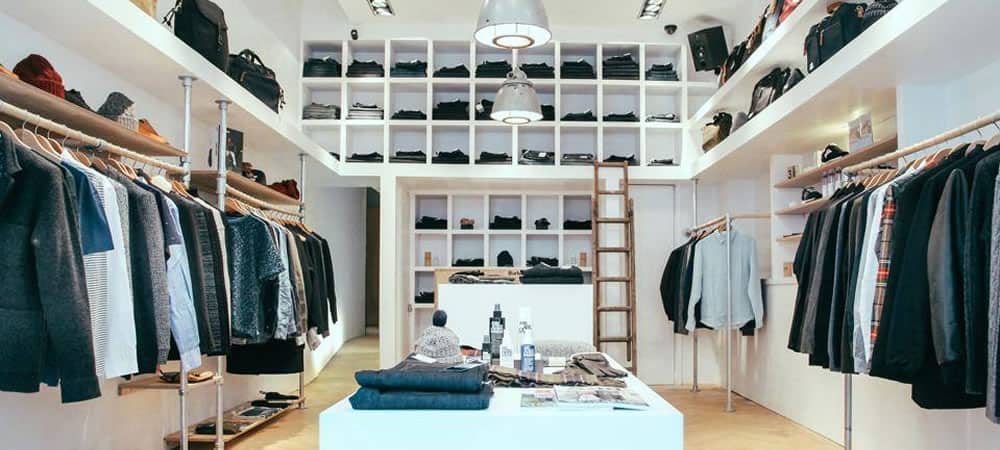“If I wanted to get a kitchen fitted,” says Steve Sanderson, owner of the excellent independent menswear shop Oi Polloi, “I’d go to a shop that specialises in kitchens, rather than the kitchen part of a department store, where they won’t know as much.”
Now, when you read that statement in isolation, it’s nothing spectacular – we’re not swapping deep, earth-shattering wisdom here, it’s just basic logic. And yet, for some reason, when I heard these words, uttered from the mouth of a very stylish gentleman, it was like a switch flicked, and the penny dropped.
“We’re stupid,” I whispered, clenching my fist. “We’re stupid, and we’re turning into zombies who don’t know how to buy kitchens properly.”
“And not just kitchens either,” my inner monologue took over and continued, building up a head of steam, “but also clothes, music, food, shoes, cars, cups, bags, books, jewellery…” (I could go on.)
I mean look at us – streaming films, waiting for online food deliveries, sitting at home in our pants hunting the internet for designer threads. Somewhere in the vast continuum of human development, any sense of basic logic has been lost – lost by our insistence on convenience over conscientiousness. There’s no sense of discernment anymore; there’s no human interaction, no care, no real appreciation of the guidance on offer in smaller bricks-and-mortar shops. I could feel the outrage burning up inside me, I felt a bit like Charlton Heston at the end of Planet of the Apes, only with slightly less sand in my underpants.
“We’re literally two evolutionary steps from becoming monosyllabic porn monkeys kept alive on Deliveroo chicken,” I quipped to Steve, who nodded and told me how clever I am*.
*OK, in the spirit of full disclosure, I didn’t say this, it came to me later.
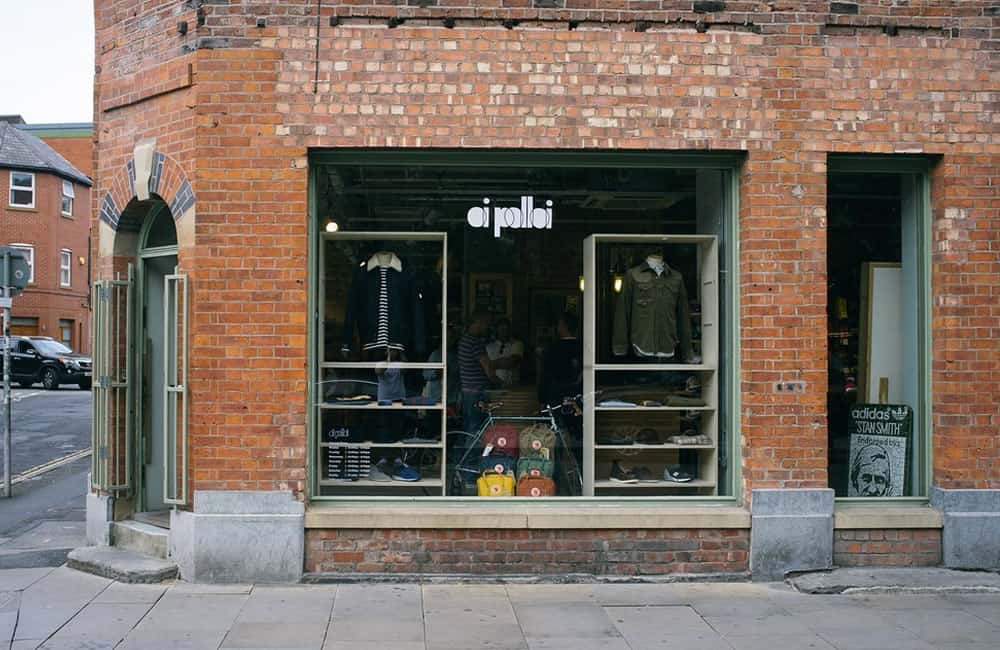
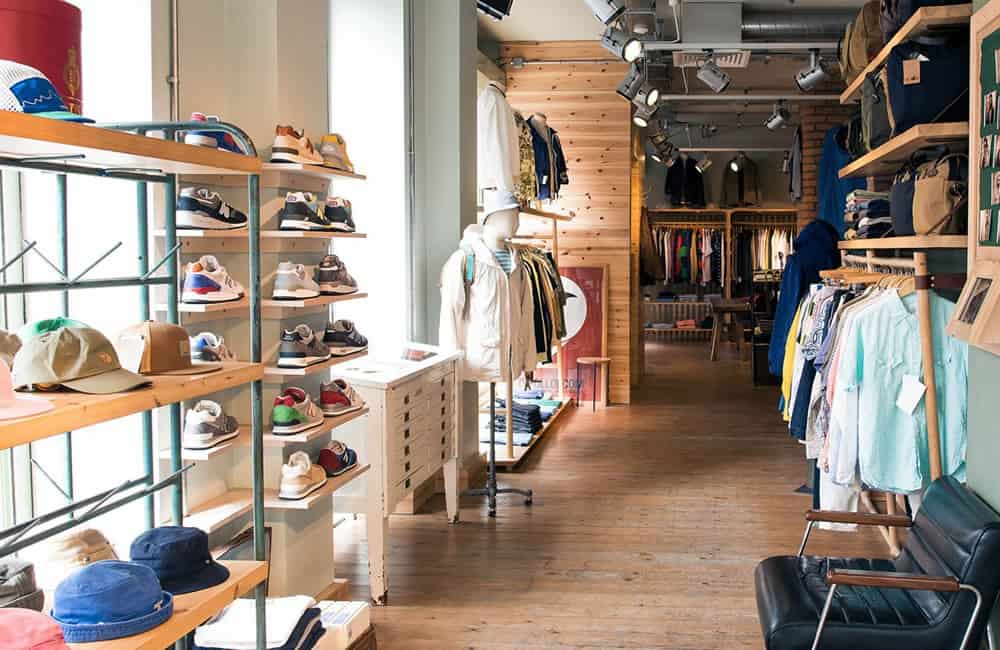 Oi Polloi, Manchester
Oi Polloi, Manchester
What’s The Root Of The Problem?
The problem, it seems, is that people don’t shop in small independent menswear shops as much as they should. As such, I’ve been tasked with a) investigating why this is, and b) explaining why we should all give them a go. Now, truthfully, I’ve developed bad shopping habits myself. I’m a freelance writer (an absurd way to make a living) with bugger all in the way of disposable income; I have a family; I’m 40; I’m a bit fatter than I should be; and I’ve stumbled into a uniform that generally finds me ducking in and out of Uniqlo or
I’m basically part of the cancer that is destroying carefully curated independents, who, over the last decade or so, have been feeling the pinch. In 2016, 15 independent shops closed every day in the UK, lots of them clothing stores. They’ve been trounced by online, and ignored in favour of big chains churning out lesser-quality goods at cheaper prices. And, in many cases, the extortionate rent they must pay was moving them onto pastures new.
“We closed the store and moved out,” says Chris Gove, the man behind premium independent menswear brand Percival (which had a great spot on Berwick Street in London’s Soho). “The rent on our shop suddenly doubled, and they wouldn’t negotiate, so that was it.”
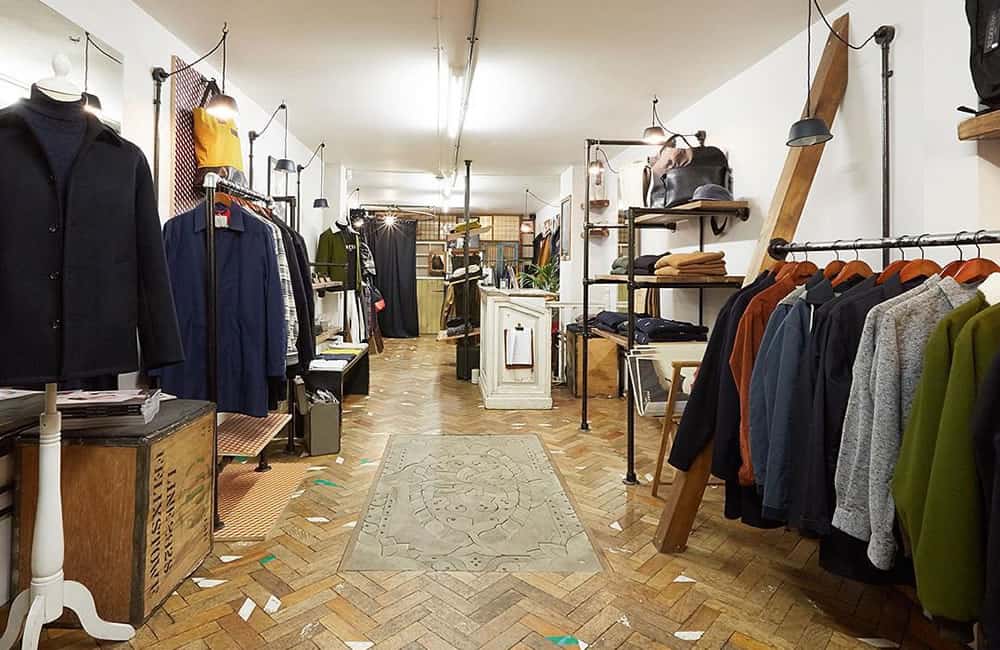 London brand
London brand
“We were upset at the time,” continues Chris, “but it was a blessing in disguise. Having the shop for three or four years was like having a billboard for the brand, and lots of our customers have stayed loyal to us since we went online. Plus I haven’t had to wrestle a thief to the floor in months.”
Unfortunately, many stores don’t enjoy such a smooth transition into cyberspace, and can be lost for good. Meanwhile, the queue for the tills in high-street chains (both on- and offline) grows like a mythical serpent, and clothes are wheeled out like cows in a cattle market to be devoured by hungry hyenas/people (i.e. most of us). It can’t be very good for the soul, can it?
Remember How Shopping Used To Be?
Now I don’t know about you, but I still remember the old days. The sheer thrill of shopping when you were younger – not the boring shopping you did with your mum, the shopping you did by yourself, for yourself, with your money, to express your own tastes and tell the world what kind of guy you are. The digging around for items that suited you, the endless experimentation that would eventually find you wandering around Bristol in your university days (1995-98, if you must know) wearing a full Kappa tracksuit, complete with blim burns, penny spec shades, and bargain basement flip-flops. Or matching your grandfather’s lovely old Marlboro Man sheepskin coat with a pair of grey pinstripe suit trousers from a local charity shop (style influence for that one: Drugstore Cowboy).
I’m not saying that these were all magical finds from tasteful boutiques, far from it. I’m just saying that it feels like there was a time when fashion was about taking your time, having fun, and making your money go as far as it could. It was about finding the best quality you could afford, and not being driven too much by fads or passing trends. Perhaps it just wasn’t prescriptive like it is now – there wasn’t so much one-stop shopping, no conveyor belt trundling along turning you into an approximation of Zayn from One Direction (not that his style is terrible, mind).
Could Vinyl Sales Bode Well For Clothes Shops?
Fittingly, it’s much the same story with music; there’s a parallel there. Being seriously into music used to take a level of dedication that would be almost unfathomable now. It wasn’t downloadable, or streamable, there was no eBay, no Discogs, and the real gems were often found in the smaller shops away from your HMVs or Virgin Megastores.
In my case, I used to collect old 1970s soul and funk records, strictly on vinyl, because the quality of the sound is richer (and also because I didn’t own a CD player). I’d spend years hunting for certain records; I’d talk for hours to people working in independent music shops, listening to their recommendations, saving up so that I could fork out on new arrivals or original pressings. My weekends were dedicated to sourcing a little stack of new sounds and taking them home for the ritual of listening to them: cuppa, cigarette and, if needs be, headphones.
Without wanting to sound too pretentious about it, they were more than just pieces of music – they were totems of some sort, validating my reasons for working, or my reasons for chomping through my weekends on a dedicated quest that might seem futile to some but meant everything to me. Hence the recent upsurge in the popularity of vinyl makes total sense – people are still hungry for authenticity, for something that sets them apart.
This surely stretches to their clothing choices too.
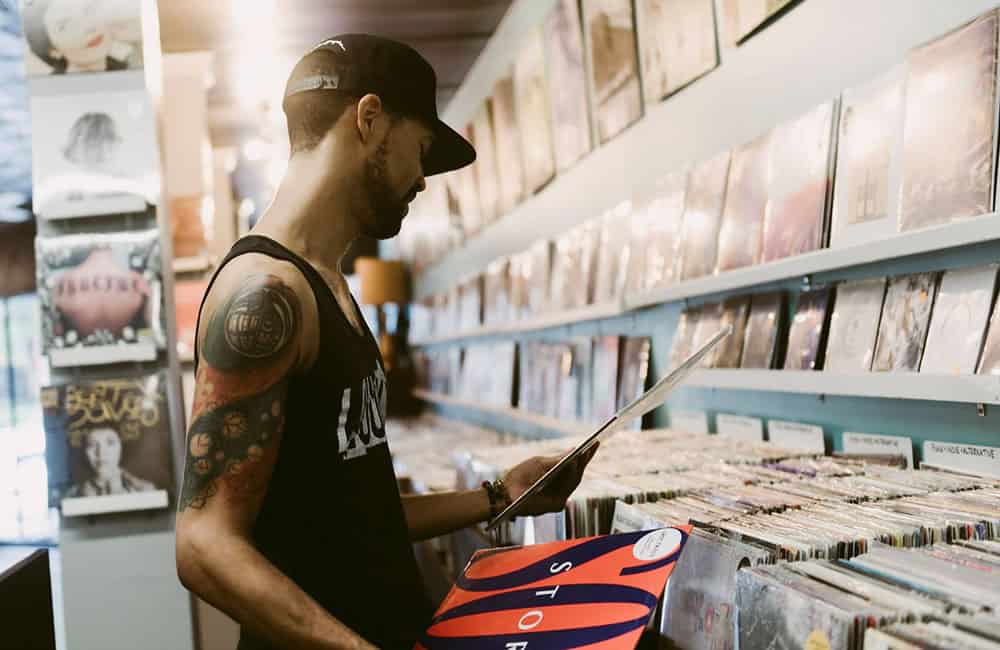 The recent uplift in vinyl sales could signal a larger shift in consumers’ buying habits
The recent uplift in vinyl sales could signal a larger shift in consumers’ buying habits
There’s A Generation That Wants More
See, for all that has been thrilling and impressive about technological advancement, you can’t manufacture that extra sensory element. You can’t recreate how something feels to touch, how a jacket boosts your confidence when you put it on, or the moment of anticipation when you first put a needle on a record. Thankfully (and reassuringly), there seems to be a generation of consumers coming through that gets this, that wants something tangible like vinyl, that wants that same sense of discovery and individuality.
Hopefully, it’s also a generation that doesn’t want to see the more interesting local shops bulldozed to make way for another estate agents, or another coffee shop, or another bakery that boasts artisanal roots but seems to be churning things out worryingly fast. A generation that has torn open its collective shirt, fallen to its knees during a figurative thunderstorm, and yelled to the heavens that they want more from the world than just the same old, same old. Good for them, I say.
Why You Should Shop At Independents
With this new generation of purists in mind, I decided it was time to take the bull by the horns, to paint myself as the worthy champion of the underdog (which, conveniently, I am), and to compile some compelling arguments as to why we should all come offline, and swerve department stores in favour of the smaller boutiques.
I sought out some experts using my advanced journalistic skills, and asked them one simple question: “Why should men buy their clothes from independent retailers?”
From there, their answers helped come up with the list below.
1. You’ll Get Clothes That Actually Suit You
“You get a higher level of service in an independent,” says legendary men’s style expert and launch editor of FHM, Eric Musgrave. “In a department store it can be hard to find someone to help you, but in an independent, you’re more likely to meet informed, passionate people who will help you get the right items, and most importantly, in the right sizes.”
2. You Will Find Brands That Don’t Exist In The Mass Market
“There’s a realness when you go into a shop,” says Sanderson from Oi Polloi. “We’ll introduce you to labels that you can’t find on the high street, brands that a lot of people haven’t heard of. We’ll tell you the story and explain why we like it.”
3. It Will Change How You Clothes Shop
“I love it when I see someone’s buying patterns change,” says Imraan Ahmed from Birmingham-based Autograph Menswear, which stocks the likes of Our Legacy, Paul Smith and Thom Browne. “And it happens all the time – they venture into new waters, and they often say that they would never have thought to try certain items if we hadn’t helped them.”
4. You’ll Get To Know The People Who Run The Shop
“You can really build a rapport with the people who work in independents,” says Ryan Keogh from Terraces Menswear in Stoke-on-Trent. “And their stock will begin to reflect and affect your tastes. Our job is to get to know you, and to make this the perfect shopping experience for you.”
5. The Higher-Quality Clothes Are A Worthwhile Investment
“Price and value are always key in our buying,” says Panicko Philippou from London’s The Content Store. “Our clothes are carefully sourced, they don’t follow fashion trends, and we ensure that you get good value for your money.”







